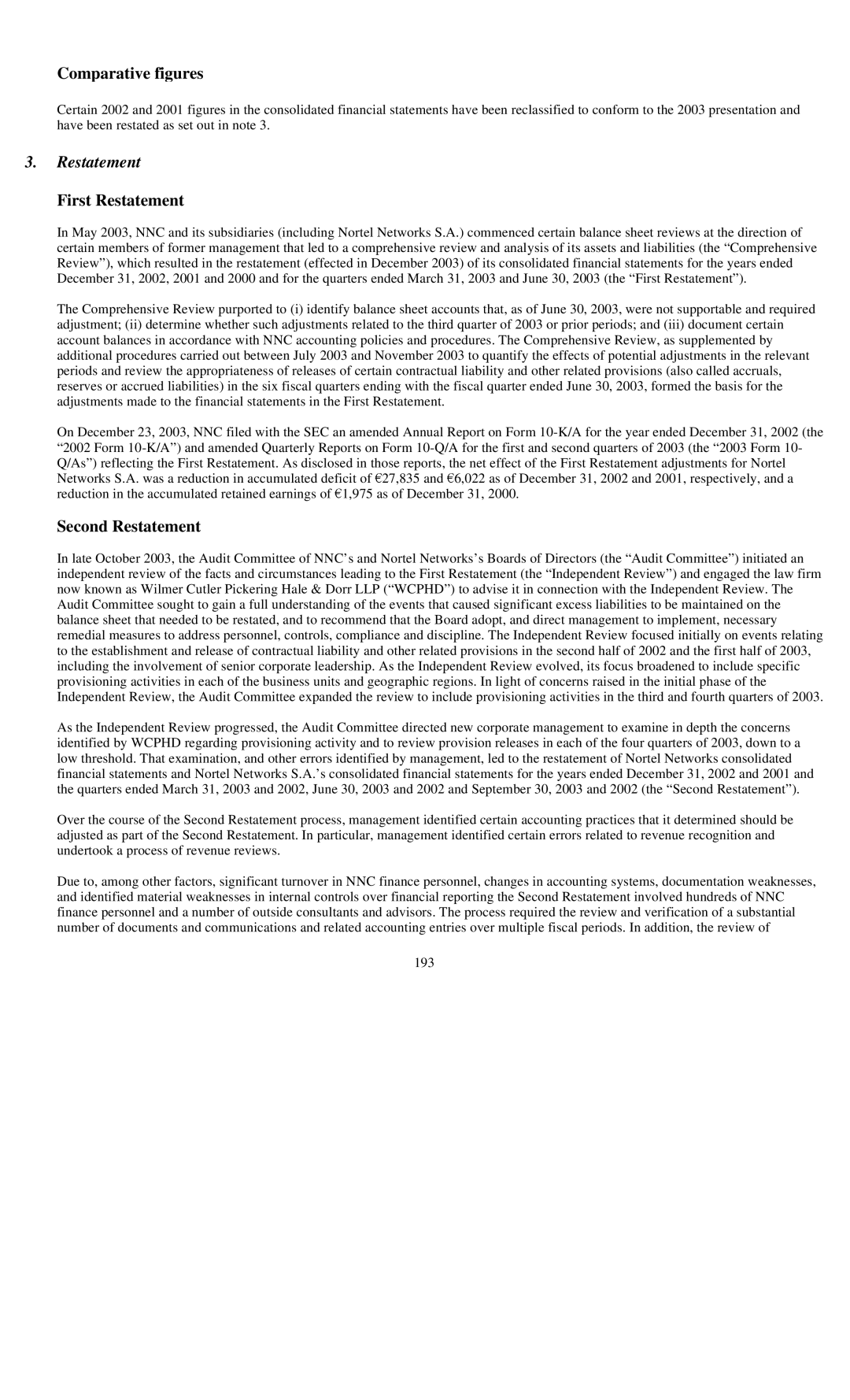Comparative figures
Certain 2002 and 2001 figures in the consolidated financial statements have been reclassified to conform to the 2003 presentation and have been restated as set out in note 3.
3.Restatement
First Restatement
In May 2003, NNC and its subsidiaries (including Nortel Networks S.A.) commenced certain balance sheet reviews at the direction of certain members of former management that led to a comprehensive review and analysis of its assets and liabilities (the “Comprehensive Review”), which resulted in the restatement (effected in December 2003) of its consolidated financial statements for the years ended December 31, 2002, 2001 and 2000 and for the quarters ended March 31, 2003 and June 30, 2003 (the “First Restatement”).
The Comprehensive Review purported to (i) identify balance sheet accounts that, as of June 30, 2003, were not supportable and required adjustment; (ii) determine whether such adjustments related to the third quarter of 2003 or prior periods; and (iii) document certain account balances in accordance with NNC accounting policies and procedures. The Comprehensive Review, as supplemented by additional procedures carried out between July 2003 and November 2003 to quantify the effects of potential adjustments in the relevant periods and review the appropriateness of releases of certain contractual liability and other related provisions (also called accruals, reserves or accrued liabilities) in the six fiscal quarters ending with the fiscal quarter ended June 30, 2003, formed the basis for the adjustments made to the financial statements in the First Restatement.
On December 23, 2003, NNC filed with the SEC an amended Annual Report on Form
Networks S.A. was a reduction in accumulated deficit of 27,835 and 6,022 as of December 31, 2002 and 2001, respectively, and a reduction in the accumulated retained earnings of 1,975 €as of December€31, 2000.
In late October 2003, the Audit Committee of NNC’s€and Nortel Networks’s Boards of Directors (the “Audit Committee”) initiated an independent review of the facts and circumstances leading to the First Restatement (the “Independent Review”) and engaged the law firm now known as Wilmer Cutler Pickering Hale & Dorr LLP (“WCPHD”) to advise it in connection with the Independent Review. The Audit Committee sought to gain a full understanding of the events that caused significant excess liabilities to be maintained on the balance sheet that needed to be restated, and to recommend that the Board adopt, and direct management to implement, necessary remedial measures to address personnel, controls, compliance and discipline. The Independent Review focused initially on events relating to the establishment and release of contractual liability and other related provisions in the second half of 2002 and the first half of 2003, including the involvement of senior corporate leadership. As the Independent Review evolved, its focus broadened to include specific provisioning activities in each of the business units and geographic regions. In light of concerns raised in the initial phase of the Independent Review, the Audit Committee expanded the review to include provisioning activities in the third and fourth quarters of 2003.
As the Independent Review progressed, the Audit Committee directed new corporate management to examine in depth the concerns identified by WCPHD regarding provisioning activity and to review provision releases in each of the four quarters of 2003, down to a low threshold. That examination, and other errors identified by management, led to the restatement of Nortel Networks consolidated financial statements and Nortel Networks S.A.’s consolidated financial statements for the years ended December 31, 2002 and 2001 and the quarters ended March 31, 2003 and 2002, June 30, 2003 and 2002 and September 30, 2003 and 2002 (the “Second Restatement”).
Over the course of the Second Restatement process, management identified certain accounting practices that it determined should be adjusted as part of the Second Restatement. In particular, management identified certain errors related to revenue recognition and undertook a process of revenue reviews.
Due to, among other factors, significant turnover in NNC finance personnel, changes in accounting systems, documentation weaknesses, and identified material weaknesses in internal controls over financial reporting the Second Restatement involved hundreds of NNC finance personnel and a number of outside consultants and advisors. The process required the review and verification of a substantial number of documents and communications and related accounting entries over multiple fiscal periods. In addition, the review of
193
